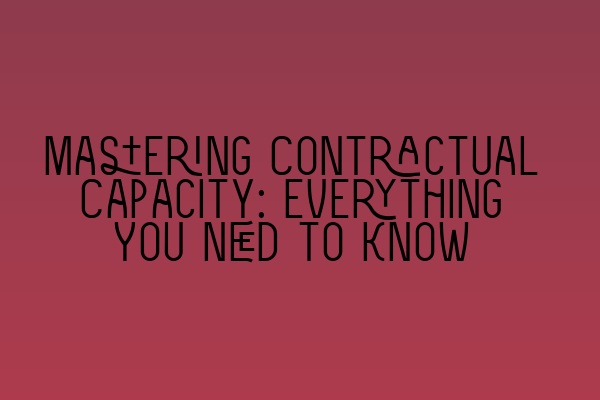Mastering Contractual Capacity: Everything You Need to Know
Contracts lie at the core of all business transactions, and understanding the concept of contractual capacity is crucial for anyone involved in such agreements. In this article, we will explore what contractual capacity entails, its legal implications, and how to ensure you master this vital aspect of contract law.
What is Contractual Capacity?
Contractual capacity refers to a person’s legal ability to enter into a contract. Not everyone has the same capacity, and the law recognizes different levels of capacity depending on various factors, such as age, mental state, and intoxication.
It’s important to note that not everyone has the mental capacity to fully understand the rights, responsibilities, and consequences of entering into a contract. This recognition by the law ensures that those with limited capacity are protected from entering agreements that they may not fully comprehend.
Who Has the Capacity to Contract?
The capacity to contract can vary based on the specific circumstances and jurisdiction, but here are some common categories:
- Adults: Generally, individuals who have reached the age of majority, which is typically 18 years old, have full contractual capacity. They are considered legally competent to enter into contracts.
- Minors: People under the age of majority, often referred to as minors, generally have limited capacity to enter into contracts. They are protected by specific laws that safeguard their interests.
- Mentally Impaired Individuals: Those with mental disabilities may have limited capacity, depending on the severity of their impairment. The law takes into account their ability to understand and make informed decisions.
- Intoxicated Individuals: Contracts entered into while under the influence of drugs or alcohol may also be challenged based on the impaired capacity of the individual at the time of agreement.
Understanding the capacity of the other party involved in a contract is essential in determining the validity and enforceability of the agreement.
The Legal Implications
The capacity of the contracting parties has significant legal implications. Contracts entered into by individuals with limited capacity may be void, voidable, or unenforceable.
Void contracts: A contract may be deemed void if one party lacks the necessary capacity. This means the contract is considered null and void right from the start, as if it never existed.
Voidable contracts: Voidable contracts are those in which a party with limited capacity has the option to either enforce or void the contract. This gives them the ability to protect their interests should they choose to do so.
